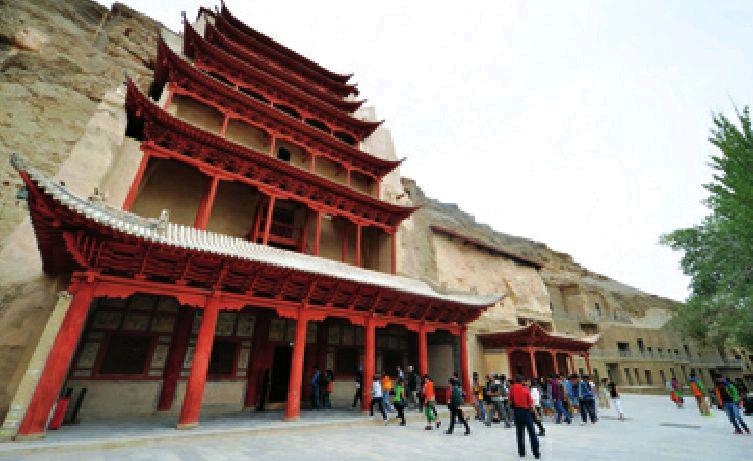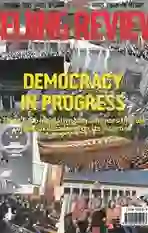Cultural Relics Reopen
2014-10-11
Tourists visit the Mogao Grottoes in Dunhuang, northwest Chinas Gansu Province, on September 10.
The largest-ever preservation project at Dunhuangs Mogao Grottoes, a collection of ancient Buddhist cave artworks, has been completed with the official opening of an affiliated visitor center on September 10.
Occupying the caves on a 1,700-meter-long cliff, the Mogao Grottoes feature some of the worlds finest Buddhist frescos and sculptures, which were made as early as 1,600 years ago. It was listed as a UNESCO World Heritage Site in 1987.
Starting from September 11, visitors are required to undergo an online reservation process in order to visit the Mogao Grottoes.
Pollution Warning
China plans a monitoring and warning system to respond to heavy air pollution, according to a revised draft of the Air Pollution Law which was released on September 9.
The document released by the Legislative Affairs Office of the State Council says that if smog is likely, provincial governments must issue warnings, and governments above the county level should have an emergency response contingency in place to cope with the situation, including restricting traffic and closing businesses or limiting production.
The government will control and reduce air pollution caused by coal consumption and production. A discharge permit system will control the emission of other major air pollutants.
Better public transportation and use of energy-saving and environment-friendly vehicles will be encouraged and the number of cars on the road kept under control. Governments above the county level can mark out areas forbidden to heavily polluting vehicles.
The draft has been put forward public opinion.
Punishing Smugglers
A new judicial explanation by the Supreme Peoples Court (SPC) on September 9 clears up ambiguities about the punishment of smugglers. The document, jointly released by the Supreme Peoples Procuratorate, states that if the amount of customs duty which a person evades through smuggling reaches 100,000 yuan($16,200), the person will face a criminal charge.
If the amount reaches 500,000 yuan ($79,365), the case will be considered serious and, if it reaches 2.5 million yuan ($396,830), the case will be deemed extremely serious.
These articles fill the blank left by the current Criminal Law that does not set clear conditions for criminal penalties in smuggling cases, said an SPC statement.
The judicial explanation also clarifies the definition of arms smuggling. Current law uses the terms “military arms” and“non-military arms.” The new document defines “firearms” and those powered by other means, such as air guns.
Unemployment Rates
A survey of 31 large and medium-sized Chinese cities found the unemployment rate remained at around 5 percent in the first eight months of the year, despite an economic slowdown, Premier Li Keqiang revealed on September 10.
It was the first time China formally disclosed a surveyed urban unemployment rate.
“More than 9.7 million urban jobs were created [by the end of August], which is over 100,000 more compared with the same period last year,” Li said in a keynote speech at the opening of the Summer Davos forum.
China introduced the registered urban unemployment rate in the 1980s as an important indicator for macroeconomic adjustment.
Nursing Homes in Tibet
Tibet plans to build nursing homes for monks and nuns inside large monasteries.
Nursing homes will be set up in 45 monasteries with more than 100 clergy each in southwest Chinas Tibet Autonomous Region, said Be Tsering, Deputy Director of the regions Religious Affairs Office. There are more than 46,000 monks and nuns in over 1,700 temples in Tibet.
The regional government contributes 26 million yuan ($4.24 million) annually toward the health insurance, pensions and accident insurance of
monks and nuns, and offers a free medical checkup every year.
Exam Reform
China plans to overhaul its college entrance exam and university enrollment system by 2020, to improve fairness and transparency.
The plan, outlined in a circular released by the State Council on September 4, will ease the intense pressure on students, as vice education minister Du Yubo told a press conference.
Targeting existing issues, the plan contains several steps to ensure the college recruitment system becomes fairer, centering on better selection of students based on their actual skills and talents.
Currently, most students enter university by taking a fixed, universal diet of exam subjects in science or arts.
Students may now submit the scores of three subjects taken throughout high school from a pool of six—biology, chemistry, geography, history, physics and politics—together with mandatory scores from their exams in Chinese, math and English. Students may resit their English proficiency test once, and submit the better score.
